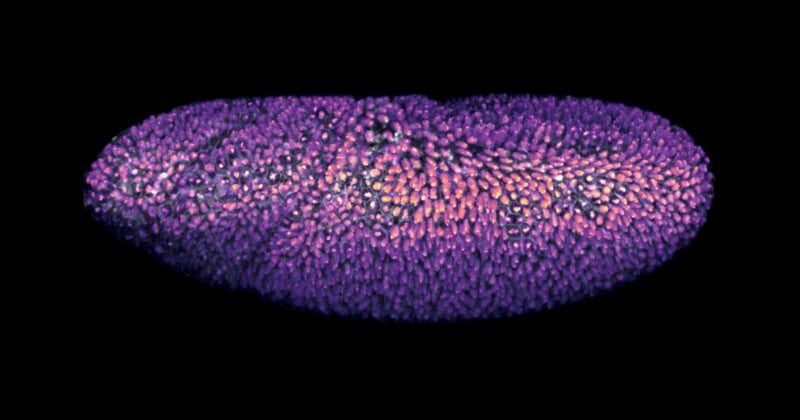
Nikon’s 14th annual Small World in Motion video competition features incredible microscopic science videos that offer beautiful visual insights into the unseen inner workings of the world.
The video component of the Nikon Small World competition, which is celebrating its 50th anniversary this year, is a popular and vital part of the contest at large.
“For the last 50 years, Nikon Small World has been a leading showcase of cutting-edge microscopy and artistic imaging. Since its inception in 2011, Small World in Motion has been a vital component of this gallery,” says Eric Flem, Senior Manager, Communications and CRM at Nikon Instruments. “As we enter a new era of the competition, we remain committed to highlighting the boundaries of innovation in scientific imaging. Nikon’s dedication to advancing science and art is especially evident in Dr. Vellutini’s winning entry, which stands as a testament to this legacy, capturing a mesmerizing movement within the microscopic world that helps deepen our understanding of a process that shapes life itself.”
This year’s first-place winner is Dr. Bruno Vellutini from the famed Max Planck Institute of Molecular Cell Biology and Genetics. Dr. Vellutini’s winning video shows mitotic waves in a fruit fly (Drosophila melanogaster) embryo. The video shows the dynamic processes of fly embryogenesis, which is essential for understanding the genetic pathways of fruit flies and how they may relate to those in humans and other mammals. Understanding fly embryogenesis has important implications for medical research, including treating cancer and potential congenital disabilities.
Dr. Vellutini, a zoologist, has an educational and professional background in evolutionary and developmental biology. His research is focused on understanding how an embryo develops from a single cell, a process universal to all animals.
“The beauty of basic research in biology is that what we learn in one organism is often applicable to others and has the potential to contribute to the understanding of human diseases,” explains Dr. Vellutini.
The winning video shows the “rhythmic waves of division and tissue movements critical to proper embryonic formation in fruit flies,” as Nikon explains. These formative processes are related to mechanisms that, when they veer off a healthy, typical course, can cause cellular diseases like cancer.
“Disruptions in these processes, such as the epithelial-mesenchymal transition — a process normal in embryogenesis but problematic when occurring unexpectedly — are known to contribute to the invasiveness of lung, liver, and breast cancer,” Nikon explains.
“Fruit fly embryos are in our homes, developing in our kitchens and our trash bins, are undergoing the same processes as shown in the video. I believe the video is particularly impactful because it shows us how these fascinating cellular and tissue dynamics are happening every day, all around us even in the most mundane living beings,” Dr. Vellutini adds.
Dr. Vellutini explains that he captured the video using light sheet microscopy, a technique that enables scientists like him to capture imaging of live embryos without causing damage. He says the most significant challenge was mounting the embryos correctly and optimizing the lighting to get clear, high-quality footage.
“Balancing light exposure to avoid harming the samples was crucial,” the doctor explains.
The Rest of the Top Five
The judging panel, which includes photo editors and scientists from around the world, also named second, third, fourth, and fifth-place winners, all of which are featured below.
Second Place — Jay McClellan (Saranac, Michigan, USA) — Water droplets evaporating from the wing scales of a peacock butterfly (Aglais io) / image stacking, timelapse / 5x objective lens magnification
Fourth Place — Dr. Ignasi Vélez Ceron, Dr. Francesc Sagués & Dr. Jordi Ignés-Mullol (University of Barcelona, Department of Materials Science and Physical Chemistry) — Friction transition in a microtubule-based active liquid crystal / fluorescence / 20x objective lens magnification
Alongside these winners, the competition also includes honorable mention recipients. These additional videos are featured on the Nikon Small World in Motion website.
Image credits: All videos are provided courtesy of Nikon Small World. Each creator is credited beneath their respective videos.
